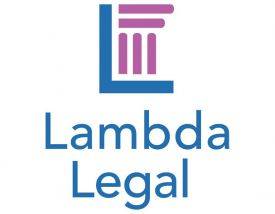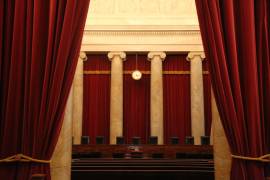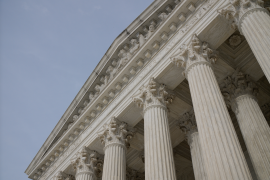This blog post was co-authored by Eric Lesh, Lambda Legal Fair Courts Project Director, and Richard Saenz, Staff Attorney and Criminal Justice and Police Misconduct Program Strategist.
The American jury system is a symbol of our democracy. The right to jury trial is guaranteed by our Bill of Rights and embedded in every one of our state constitutions. In criminal cases, the Sixth Amendment guarantees the right to an impartial jury. Yet our jury system is plagued by a history of exclusion and discrimination.
At a time of important civil rights advancements, in many parts of the country, the purposeful exclusion of black people from juries persisted through the 1960s and beyond. It wasn’t until the 1986 case of Batson v. Kentucky that the Supreme Court finally found as unconstitutional the discriminatory elimination of otherwise qualified jurors simply on the basis of race
Despite the Supreme Court ruling in Batson, racial discrimination in jury selection is still widespread. The Equal Justice Initiative has documented that prosecutors continue to use peremptory challenges (a means of allowing jurors to be removed for no reason at all) in order to create racially unrepresentative jury panels.
Yesterday, the U.S. Supreme Court decided an important case that could have a significant impact on efforts to prevent or stop racial discrimination in jury selection.
In 1987, Timothy Foster, a black defendant, was charged with killing Queen Madge White, a 79-year-old white woman in Rome, Georgia. During Foster’s trial, the state prosecution eliminated all four black prospective jurors and argued for a death sentence to “deter other people out there in the projects.” When challenged by the defense, the Georgia trial court accepted the prosecution’s “race-neutral” reasons for each strike, and an all-white jury sentenced Foster to death.
More than two decades later, through the Georgia Open Records Act, Foster obtained from the State copies of the file used by the prosecution during the trial. The prosecution’s notes revealed that they labeled each black juror with a “B” and ranked each juror in order of preference if “it comes down to having to pick one of the black jurors.”
In Foster v Chatman, the justices ruled 7-1 that, with respect to two of the challenges, Georgia prosecutors purposely targeted black jurors to keep them off the trial — and that such a move was unconstitutional.
“The focus on race in the prosecution’s file plainly demonstrates a concerted effort to keep black prospective jurors off the jury,” Chief Justice John Roberts wrote in the opinion for the Court. “Two peremptory strikes on the basis of race are two more than the Constitution allows.” Foster’s case now goes back to back to the Georgia courts for further review.
Discrimination in the jury selection process reinforces historical bias and prejudice in the judicial system, interferes with the litigants’ right to a fair trial, and undermines public confidence in the courts.
Concern that bias, prejudice, and politics will interfere with the fair administration of justice is particularly consequential when an individual’s very life is at stake. Since 1977, the overwhelming majority of death row defendants (77%) have been executed for killing white victims, although black people make up about half of all homicide victims. Bias in the courts — including racism, gender bias and homophobia — affects who is sentenced to death and is one of the reasons that Lambda Legal opposes the death penalty as a harsh and irreversible misuse of government power.
Though discriminatory peremptory challenges persist, a finding by a judge that a strike was racially motivated is extremely rare. Stephen Bright, who argued on Foster’s behalf, said in an interview that elected state judges — often former prosecutors themselves — find it politically and psychologically difficult to rule that a prosecutor standing before them intentionally discriminated against a juror and then lied about it when giving “race-neutral” reasons. This is yet another troubling consequence of judicial elections and the public pressure placed on judges to appear “tough on crime” if they hope to keep their jobs.
Bias and discrimination in jury selection are serious problems on many fronts throughout the trial system. For example, lawyers continue to disqualify potential jurors on the basis of their sexual orientation or gender identity, and there is no federal law expressly prohibiting such discrimination. Lambda Legal supports the Jury ACCESS Act , which would ban discrimination on the basis of sexual orientation and gender identity in federal jury selection.
In 2000, a California state court in the case of People v Garcia, became the first in the country to rule that state law prohibited removing jurors on the basis of their sexual orientation, and in 2014 the Ninth Circuit Court of Appeals became the first federal court to rule in SmithKline Beecham Corp. v. Abbott Labs, that disqualifying jurors based on their sexual orientation directly contravenes the Equal Protection Clause of the U.S. Constitution.
To help legal practitioners confront anti-LGBT bias and discrimination in jury selection, Lambda Legal’s Fair Courts Project just launched a new resource: Jury Selection and Anti-LGBT Bias: Best Practices in LGBT-Related Voir Dire and Jury Matters. This resource is for use by both prosecutors and defense attorneys, and in civil cases.
As with other groups targeted with invidious discrimination, far too often discrimination against LGBT people has found its way into the courtroom, denying them equal access to justice and an equal opportunity to participate in civic life.
We must end discrimination and prejudice in all aspects of our criminal legal system — including state courts. Learn more about how each of us can take action to protect fair courts.





